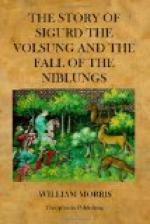Long Sigurd looked and marvelled,
and up-raised his heart and his mind;
For he deemed that beyond
that rock-wall bode his changed love and life
On the further side of the
battle, and the hope, and the shifting
strife:
So up and down he rideth,
till at even of the day
A hill’s brow he o’ertoppeth
that had hid the mountains grey;
Huge, blacker they showed
than aforetime, white hung the cloud-flecks
there,
But red was the cloudy crown,
for the sun was sinking fair:
A wide plain lay beneath him,
and a river through it wound
Betwixt the lea and the acres,
and the misty orchard ground;
But forth from the feet of
the mountains a ridged hill there ran
That upreared at its hithermost
ending a builded burg of man;
And Sigurd deemed in his heart
as he looked on the burg from afar,
That the high Gods scarce
might win it, if thereon they fell with war;
So many and great were the
walls, so bore the towers on high
The threat of guarded battle,
and the tale of victory.
Then swift he hasteneth downward,
lest day be wholly spent
Ere he come to the gate well
warded, and the walls’ beleaguerment;
For his heart is eager to
hearken what men-folk therein dwell
And the name of that noble
dwelling, and the tale that it hath to tell.
So he rides by the tilth of
the acres, ’twixt the overhanging trees,
And but seldom now and again
a glimpse of the burg he sees,
Till he comes to the flood
of the river, and looks up from the balks
of the bridge;
Then how was the plain grown
little ’neath that mighty burg of the
ridge
O’erhung by the cloudy
mountains and the ash of another day,
Whereto the slopes clomb upward
till the green died out in the grey,
And the grey in the awful
cloud-land, where the red rents went and came
Round the snows no summers
minish and the far-off sunset flame:
But lo, the burg at the ridge-end!
have the Gods been building again
Since they watched the aimless
Giants pile up the wall of the plain,
The house for none to dwell
in? Or in what days lived the lord
Who ’neath those thunder-forges
upreared that battle’s ward?
Or was not the Smith at his
work, and the blast of his forges awake,
And the world’s heart
poured from the mountain for that ancient
people’s
sake?
For as waves on the iron river
of the days whereof nothing is told
Stood up the many towers,
so stark and sharp and cold;
But dark-red and worn and
ancient as the midmost mountain-sides
Is the wall that goeth about
them; and its mighty compass hides
Full many a dwelling of man
whence the reek now goeth aloft,
And the voice of the house-abiders,
the sharp sounds blent with the
soft:
But one house in the midst
is unhidden and high up o’er the wall it




